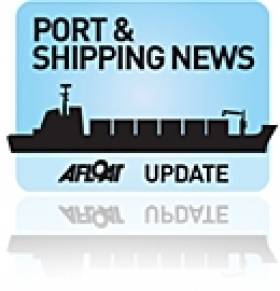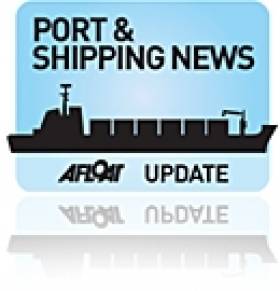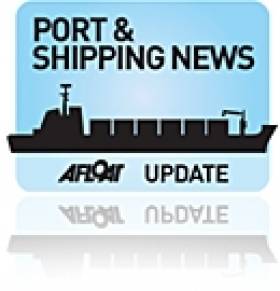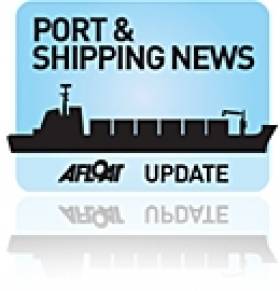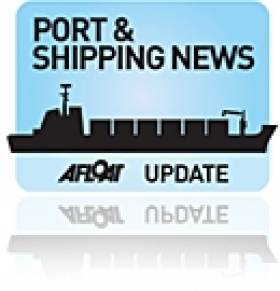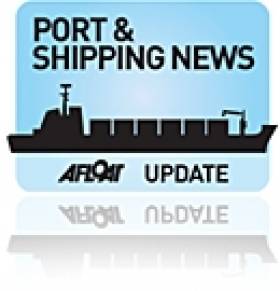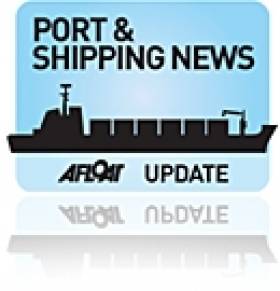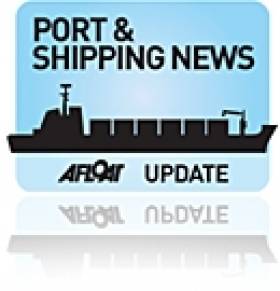Displaying items by tag: IMDO
IMDO Launch Report on Irish Tonnage Tax Opportunities for International Shipping Industry
#IrishTonnageTax - The Irish Maritime Development Office (IMDO) has released a report Irish Tonnage Tax: Opportunities for the International Shipping Industry.
The Irish tonnage tax regime has been established for over 10 years and offers one of the most competitive on-shore corporate tax rates to international shipping companies.
The tonnage tax report was produced by independent experts PwC and details the benefits of locating a maritime operation in Ireland. The report provides an update on Ireland's extensive double tax treaty network.
Ireland's role is highlighted in its expertise in asset leasing and for having a well developed structured finance regime which can be directly applied to international maritime financing.
The Irish tonnage tax is derived from a 'notional' profit calculated based on the tonnage of a vessel, which is then subject to the Irish corporate tax rate of 12.5%.
The IMDO is the Irish government agency which provides support and advice to Maritime companies setting up operations in Ireland. In his forward to the report, IMDO Director Liam Lacey says 'this publication provides independent validation of Ireland's status as a world class location in which to conduct business and more particularly, sets Ireland apart as a hub for maritime commerce'.
As a country, Ireland continues to maintain its reputation as a pro-business environment that has attracted investment from some of the world's largest companies over the past three decades.
In Forbes' 2014 annual ranking of the Best Countries for Business, Ireland was named number one country in the world for business.
More recently, figures released by the Irish Central Statistics Office (CSO) show that the national economy grew by more than seven times the EU average between April and June 2014. This is the strongest growth rate recorded in Ireland since the early 2000's, showing a strong and stable recovery.
Continuing in this vein, the Irish Economic and Social Research Institute (ERSI) predict that Ireland's GNP is to grow by approximately 5% in 2014 and 5.3% in 2015.
Irish Tonnage Tax: Opportunities for the International Shipping Industry is available to download by clicking HERE
For more information on the report and locating a maritime operation in Ireland, contact Rebecca Wardell by calling +353 (0)1 476 6518 / +353 (0)87 798 0089 or email: [email protected]
First Irish Maritime Forum Deemed a Success
#IrishMaritimeForum – The inaugural Irish Maritime Forum recently held in Cork was attended by more than 150 delegates representing the shipping industry, various stakeholders and departments and the Irish government agency, the Irish Maritime Development Office (IMDO).
According to the IMDO, they were delighted to join an exciting line up of speakers for the event's main seminar entitled 'Developing the Dynamic Future of Ireland's Maritime Sector' which was hosted by the Port of Cork in partnership with the Irish Ports Association.
Combined they gathered industry leaders from across the Irish maritime sector to the conference that was opened by Minister Sean Sherlock TD, who spoke of the importance of ports as strategic points for trade growth, both nationally and internationally. The minister also drew attention to the recent uplift in port volumes as indicated by the IMDO's iship index.
A cross section of the Maritime world was in evidence with port operators, department representatives, pilots, stevedores, European officials, educators, mariners and many more all contributing to meaningful debate during the conference and well into the break out times.
Speaking at the event, the IMDO's Business Development Manager Rebecca Wardell, emphasised the necessity for ports to look at potential areas of innovation, efficiency in work practices, competition across services and planning the means to meet future capacity demands over a 20 year plus horizon.
She also stressed the IMDO's commitment to be involved in an on-going collaborative process to assist ports in this regard.
The importance of a forum such as this cannot be underestimated, creating a unique opportunity for those in the industry to come together and develop ideas for the future of the sector. This is particularly relevant at present with significant government support for the development of the sector evidenced by the cross departmental strategy, Harvesting Our Ocean's Wealth.
On a related note, another major conference Our Ocean Wealth was held last June in Dublin, for more details about the work of 'harvesting' our national resources, visit: www.ouroceanwealth.ie
Following the conclusion of the Irish Maritime Forum, a Gala Dinner that evening was hosted by the Irish Institute of Master Mariners, for further details about the IMM: www.mastermariners.com
For further information on the role of the IMDO including the iShip Index and much visit: www.imdo.ie
Vacancy: Business Development Manager at the IMDO
#VacancyIMDO – The Irish Maritime Development Office (IMDO) which was established by Statute in December 1999 and commenced operations in July 2000, is currently inviting applications for the position of Business Development Manager.
The Business Development manager will be responsible for delivering new clients in a pressurised and competitive environment.
For further details of the job description click HERE and as how to apply. Noting the closing date of applications must be received by 17:00 on Friday 23rd May 2014.
ShortSea 2014 European Conference Heads for Lisbon
#ShortSea14 – This year's ShortSea European conference will take place in the Portugese capital of Lisbon (12-13 May), and follows previous conferences held in Paris 2013 and Dublin the proceeding year.
It will be supported by the Shortsea Promotion Centres from the Maritime Member States of the EU, and the conference will be an ideal opportunity to keep up to date in developments and trends.
In addition the venue is where you can meet your peers and to network in the industry.
For further information, click to download conference programme.
Irish Maritime Development Office Seeks Director
#marinejobs – The Marine Institute is seeking to employ a Director for the Irish Maritime Development Office (IMDO). A member of the senior management team, the Director will lead a small team providing a wide range of services both to the public and private sector, such as business development, policy support, market intelligence, education and contributing to the formulation of sectoral strategies. A key deliverable is the provision of reports and advice to the Department of Transport, Tourism and Sport, including the quarterly Transport Economist.
The Director will be primarily responsible for managing the process of innovation and strategy to support the continuous growth and development of the shipping services sector in Ireland. They will be engaged at a high level supporting development with maritime companies and organisations in Ireland while working with major international shipping groups and shipping lines already doing business in Ireland.
The successful candidate will work closely with government departments, external parties and key stakeholders, providing market intelligence and critical inputs to policy advice or future development and support
To be successful, the candidate will have a minimum of ten years direct experience in the national and international shipping sectors, ideally in the areas of ship management, ship broking, finance or maritime economics. The candidate will also have a relevant degree or equivalent professional qualification and experience. The candidate will have successfully managed programmes, people and resources at a senior and strategic level and been involved in communicating and building relationships with stakeholders.
A detailed job description can be downloaded from the current vacancies section of our website at www.marine.ie.
If you meet all of our requirements, we would be delighted to hear from you. Please send your letter of application and an up to date CV to Catherine Johnston, Human Resources Manager, Marine Institute, Rinville, Oranmore, Co Galway or email to [email protected]. Please note email applications will only be accepted at this address and applications are not valid until you have received confirmation of your application.
The closing date for receipt of applications is 17:00 on Tuesday 7th January 2014. Late applications will not be accepted.
The Marine Institute is an equal opportunities employer.
D’Amico Dry’s ‘Dublin’s sister ‘San Francisco’ Docks in Cork’s Ringaskiddy Deepwater Terminal
#DublinsSister – Cielo di San Francisco a 37,000 dwt 'Handysize' dry-bulker docked in Cork's Ringaskiddy Deepwater Terminal from New Orleans, she is operated by Dublin based d'Amico Dry, writes Jehan Ashmore.
She along with a sister Cielo di Dublino, as previously reported in 2011, where acquired by d'Amico Dry, which is a subsidiary of the Italian d'Amico Group.
The christening ceremony of Cielo di San Francisco was performed by Mrs. Sandra Murphy, wife of Mr. Glenn Murphy, Director, Irish Maritime Development Office (IMDO).
The Liberian flagged vessels cost around US $60 million and were completed in South Korea at the Hyundai Mipo Dockyard (HMD) in Ulsan. The ships principle dimensions are 182m long, 27m beam and a 10.4m draught.
The entry by d'Amico Group into the dry-bulkers market had marked an important chapter since the subsidiary established an Irish office in 2002, as the vessels are managed from its Dublin office under the Irish Tonnage Tax (ITT) regime.
d'Amico Dry is engaged in chartering activities also in Monaco, Singapore, Vancouver and Stamford (US). Its core fleet is focused on Panamax, Supramax and Open Hatch/Box Shaped Handy size vessels, consists of a mixture of owned and long-term time chartered vessels.
Cielo di San Francisco is scheduled to depart Cork Harbour this evening and dock in Dublin Port tomorrow.
#IrishShippingSector – Irish based shipping companies in 2012 experienced a challenging year with operations in both the domestic and international shipping markets, according to the Irish Maritime Development Office (IMDO).
Against this turbulent backdrop, the number of vessels being owned, controlled, managed and operated from Ireland remained steady at 340 vessels last year. The IMDO estimate that employment at these firms increased by 5% last year.
A key element in the overall stability of this segment of the Irish maritime sector has been the constant presence of the Irish Tonnage Tax regime which was the introduced in 2002.
Since the scheme began the IMDO has seen a reversal of a previous decline in the indigenous ship owning sector which has been followed by a steady growth and investment programme.
The scheme has gone from approximately 40 vessels to just over 300 vessels, owned, managed and operated by companies located in Ireland.
Latest data indicates that over 56% of the fleet is made up of dry bulk carriers, 21% tanker and 12% container with other Ro/Ro and other specialised vessels making up the remainder of the fleet.
The age profile of the fleet indicates that it is also a modern fleet with 70% of the vessels less than 10 years old and more than 52% under five years.
The industry's growth in Ireland has been driven both by established Irish shipping companies and also by foreign inward investment by overseas firms.
The Tonnage tax has made a positive economic contribution to Ireland and to the shipowning sector in Ireland. It has resulted in the creation of new jobs and investment opportunities for over 600 people and continues to grow.
The IMDO estimate that over €3 billion of shipping assets are managed and controlled from Ireland with more than 100 new direct jobs being created over the last three years alone.
In The Irish Times (dated 24 May) Top 1000 companies in Ireland this included a top 100 transport related companies.
The IMDO analysis indicates that 29 companies listed are engaged in shipping, ports and maritime logistics that had a combined turnover of €4.5bn employing 4700 people. Six Irish Shipping and leasing firms made the top 1000 companies last year.
#Ports&Shipping –The latest IMDO Weekly Shipping Market Review includes the following stories as detailed below.
Container Market: SCFI rates diverge - According to figures from the Shanghai Containerised Freight Index (SCFI), spot box rates for long-haul cargoes from China are diverging. Fairplay have reported that due to sluggish demand and high capacity, Asia-Europe rates continued to decline last week. Rates to Northern Europe fell 9% to $668 per TEU, with a very notable drop of 35% to $779 per TEU for shipments to the Mediterranean.
Tanker Market: Product recovery - The opening of Saudi Arabia's new refinery on the coast of the Middle East Gulf points towards a recovery for the product tanker market, as noted by Lloyd's List. According to the International Energy Association, the 400,000 barrel per day Jubail refinery is part of an influx of new Saudi refineries, which will hugely influence global trade in refined oil products.
Dry Bulk Market: Fleet growth slows - It is forecast that the global fleet of ships that carry minerals and grains will expand at its slowest pace in a decade, according to DNB Markets. The fleet will most likely expand by 5% in 2014, slower than the 7% expansion experienced for 2013. This provides some optimism for the dry bulk fleet, as tonne-mile demand will rise by 10% in 2013 and outpace fleet growth for the first time in six years.
For more of the above visit the IMDO Weekly Markets Review (Week 21) and also on Afloat.ie's dedicated Ports & Shipping section
Irish Ports Witness Surge in Animal Feed Imports
#FodderShipments – As Irish Farmers struggle with one of the worst fodder crisis in over 50 years, ports across the country have seen unprecedented levels of animal feed imports, according to the Irish Maritime Development Office (IMDO).
Most of the State's ports have seen notable throughput increases since the third quarter of 2012, after a poor summer period for farmers. The IMDO noted that the first quarter of 2013 saw volumes of animal feed increase by over 80% in terms of bulk shipments, on the corresponding period last year.
In the recently published Irish Maritime Transport Economist, the IMDO reported substantial annual growth in animal feed imports, which increased by 34% during 2012.
A number of farming interest groups have come together to support the importation of animal feed from the UK and France in recent months, resulting in increased activity on Irish Sea ferry services, particularly over the last three weeks.
The IFA sourced the first consignment of hay from France which arrived at Rosslare Europort on the 9 May aboard the ro-pax ferry Celtic Horizon.
During this month's bank holiday, ports also recorded increased fodder imports from bulk shipments.
The western and northern parts of the country appear most severely impacted and it is anticipated that fodder will continue to steadily arrive at Irish ports for the foreseeable future.
IMDO Shipping Review: Irish Industrial Productivity Drops, European Port Growth, Asia-Europe Trade Increases and much more…
#Ports&Shipping -The latest IMDO Weekly Shipping Market Review reports that Irish industrial production fell by almost 2 per cent in January, compared to the previous month, in line with weakening trend in industry since mid-2012, according to data released by the Central Statistics Office (CSO).
European Ports: Throughput at northern European ports will grow by 1.8% in 2013, after a decline of 0.8% last year, according to the latest North Europe Global Port Tracker report.
Container Market: Asia-Europe trade volumes lane experienced their first year-on-year increase in almost a year, according to Container Trade Statistics. The latest data reveals that westbound volumes on the Asia to Europe trade increased by 2.5% year on year in January to reach 1.3m TEU.
The complete IMDO Shipping Markets Review for week 10 is available as a PDF to read or download HERE.


























